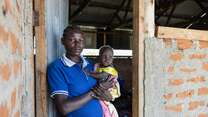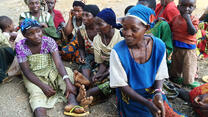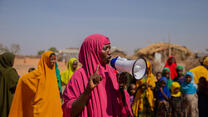Approximately 72 million women and adolescent girls are currently in need of humanitarian assistance. Countries with humanitarian emergencies are home to only 13% of the global population, but they account for 58% of global maternal deaths, 39% of newborn deaths, 41% of stillbirths and 25% of women with an unmet need for family planning*. In crisis and conflict settings, women and girls face heightened and compounded risks, including childbirth without skilled care, lack of contraception, increased exposure to violence and exploitation, and unsafe abortions.
The International Rescue Committee (IRC) is committed to helping them survive and take control of their lives, from the earliest stages of crisis through recovery and development. In 29 countries affected by crisis in Africa, Asia, the Middle East, Latin America and Europe, we support local governments and partners to expand access to SRHR through high-quality service delivery, evidence generation and strategic national and global advocacy. We implement simple, cost-effective and proven solutions that result in fewer unintended pregnancies and unsafe abortions, safer pregnancy and childbirth, reduced harm from gender-based violence and reduced morbidity from STIs and HIV.
Our approach is client-centered and grounded in feminist principles, supporting the fundamental right of women and girls to make decisions about their health, well-being, and futures—because we know that the right to choose matters most in the hardest of times. We work in partnership with civil society organizations and government agencies to deliver comprehensive sexual and reproductive health services, transform harmful gender norms, generate evidence and learning, and advocate for the rights of women and girls in humanitarian and fragile settings.
What We Do
Provide comprehensive sexual and reproductive healthcare: In 29 countries worldwide, the IRC supports the delivery of comprehensive sexual and reproductive healthcare services, including maternal and newborn care, contraception, comprehensive abortion care, clinical care for survivors of gender-based violence, and prevention and treatment of sexually transmitted infections, including HIV, with a specific focus on adolescent girls.
Generate evidence and learning: The IRC is dedicated to transforming humanitarian aid by designing and researching scalable solutions. Our multidisciplinary teams use iterative, evidence-based approaches grounded in client perspectives and frontline expertise. To eliminate barriers to SRHR, we focus on a range of research priorities including but not limited to: leveraging self-care to revolutionize access to contraception and safe abortion care, developing evidence to improve community-based delivery of maternal and newborn care and testing context-adapted proven approaches to reducing maternal mortality attributed to postpartum hemorrhage in crisis-affected settings.
Advocate for sexual and reproductive rights: An enabling environment is critical for achieving sustainable and accessible SRHR in humanitarian and fragile settings. This environment requires supportive policies and consistent coordination among key decisionmakers, healthcare providers, and women and girls. The IRC works to build this environment by leading and supporting strategic advocacy—globally, regionally, and nationally—to ensure humanitarian considerations are fully integrated into all relevant policies, procedures, and practices.
Learn more about IRC’s critical SRHR work in the resources below.
*Estimate derived from IRC internal analysis using data from 2024 Humanitarian Response Plans and global SRH-related burden estimates.


